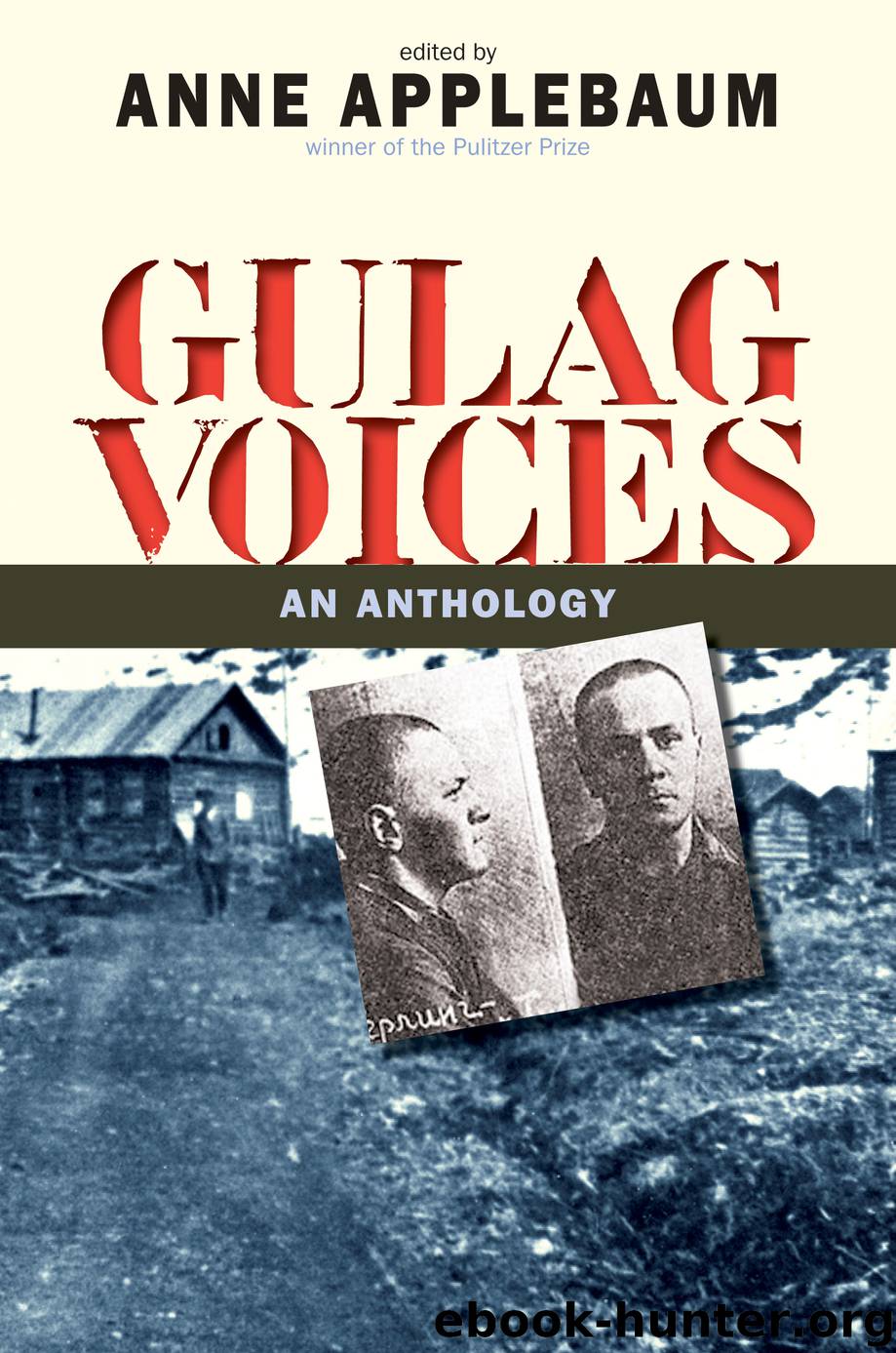Gulag Voices by Anne Applebaum

Author:Anne Applebaum
Language: eng
Format: epub
Publisher: Yale University Press
Published: 2010-05-24T16:00:00+00:00
8.
HAVA VOLOVICH
Hava Volovich was born in 1916. She worked as a typesetter, then as a newspaper subeditor, in a small Ukrainian town, where she watched friends and family die all around her during the famine of 1932–33. She stayed alive herself only because of the ration card she received at work. She began speaking openly and critically about the damage being done to Ukrainian peasants by the new collective farms and confiscation policies, and as a result she was arrested in 1937. She remained in the camps for sixteen years, until 1953.
After she came home, Volovich held a series of low-ranking jobs—on a pig farm, as a night watchman, as a factory stoker. Her short memoir, plainly but strongly written, appeared in 1989 along with several other women’s memoirs in a much-admired anthology. Published by Vozvraschenie, an organization dedicated to the collection and preservation of Gulag memoirs, the anthology later appeared in English under the title Till My Tale Is Told. Even in this extraordinary collection of essays, some by famous writers, Volovich’s story stands out: she, like Elena Glinka, was not afraid to touch on taboo subjects.
To my mind, the excerpt reprinted here is one of the most difficult to read in all of Gulag literature. In just a few paragraphs, Volovich narrates, with heartbreaking honesty, the story of the child born to her in the camp. This kind of story was shockingly common: there were many children born in the Gulag, as well as many children brought into the Gulag by nursing mothers. A 1949 administrative report on the condition of women recorded that of 503,000 women officially imprisoned in the Gulag, 9,300 were pregnant, and another 23,790 had small children living with them.
Because the mothers were prisoners and were supposed to be working, nurseries were created especially to care for the children. Stalin had once declared that “sons are not responsible for the crimes of their fathers,” and thus the state, in theory, meant to take care of even the offspring of criminals. Gulag officials issued stern instructions from Moscow, such as one that decreed that “toys which are not spoiled by washing and boiling, made of rubber, celluloid, and bone, shall be permitted.” Strict breast-feeding schedules allowed women short, twenty-minute work breaks to visit the nursery.
In practice, these places were shockingly inadequate, and many infants subjected to this kind of breast-feeding regime died. Those who made it past the first year were often deeply damaged. Yevgenia Ginzburg, who worked in one of these nurseries, recalled that many of the children had had so little human contact they could barely speak: “Inarticulate howls, mimicry, and blows were the main means of communication.” She did her best to help them, as Volovich did her best to help her own child, but the powerful indifference of the camp administrators meant that many of the children suffered a terrible fate.
Download
This site does not store any files on its server. We only index and link to content provided by other sites. Please contact the content providers to delete copyright contents if any and email us, we'll remove relevant links or contents immediately.
| France | Germany |
| Great Britain | Greece |
| Italy | Rome |
| Russia | Spain & Portugal |
Fanny Burney by Claire Harman(25790)
Empire of the Sikhs by Patwant Singh(22183)
Out of India by Michael Foss(16313)
Leonardo da Vinci by Walter Isaacson(11914)
Small Great Things by Jodi Picoult(6105)
The Six Wives Of Henry VIII (WOMEN IN HISTORY) by Fraser Antonia(4797)
The Wind in My Hair by Masih Alinejad(4427)
The Lonely City by Olivia Laing(4122)
The Crown by Robert Lacey(4111)
A Higher Loyalty: Truth, Lies, and Leadership by James Comey(4038)
The Iron Duke by The Iron Duke(3649)
Millionaire: The Philanderer, Gambler, and Duelist Who Invented Modern Finance by Janet Gleeson(3574)
Sticky Fingers by Joe Hagan(3456)
Alive: The Story of the Andes Survivors by Piers Paul Read(3317)
Papillon (English) by Henri Charrière(3276)
Joan of Arc by Mary Gordon(3263)
Stalin by Stephen Kotkin(3089)
Aleister Crowley: The Biography by Tobias Churton(3024)
Ants Among Elephants by Sujatha Gidla(2927)
